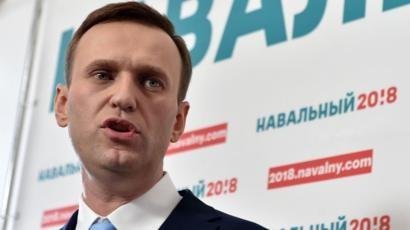Russian presidential election: Alexei Navalny barred from competing

Russian opposition leader Alexei Navalny has been formally barred from competing in next year's presidential election.
The Central Electoral Commission has said Mr Navalny was ineligible because of a corruption conviction which he says is politically motivated.
He has urged his supporters to boycott the March vote.
Mr Navalny, 41, was widely regarded as the only candidate with a chance of challenging President Vladimir Putin.
"We're declaring a strike by voters. The procedure that we're invited to take part is not an election," Mr Navalny said after the decision, adding that he would lead protests across the country.
Known for his anti-corruption campaign and protests against Mr Putin, Mr Navalny was given a five-year suspended sentence in a retrial earlier this year on embezzlement charges.
Navalny: Russia's vociferous opposition leader
The commission's head, Ella Pamfilova, said her institution was simply applying the law which disqualifies Mr Navalny. Twelve of the 13 members rejected his application as candidate, with one member abstaining citing a conflict of interest.Reacting to the widely expected decision, Mr Navalny said the case was intended to block him from "speaking the truth" about the situation in Russia, and that barring him from running would deny millions of Russians their vote.
"Only Putin and the candidates that he personally chose, ones who don't pose the slightest threat to him, are taking part [in the vote]," he added.
He said he would launch an appeal in Russia's Constitutional Court.
Mr Navalny said on Sunday he had gathered the 500 signatures needed to secure his candidacy, hoping that this would pressure the election commission into allowing him to run.
Presentational grey line
Where now for Navalny's campaign?
By Sarah Rainsford, BBC News, Moscow
Alexei Navalny is far from the only opposition politician in Russia. But the anti-corruption campaigner is currently the most popular and best known.
For months he's been travelling the country to meet voters, stage rallies and protests. He's been trying to force the authorities to let him run for president by demonstrating his widespread support.
There was some speculation that the Kremlin might consider that, to ignite interest in an insipid race and boost Vladimir Putin's legitimacy. But it would also give Alexei Navalny a nationwide TV platform to criticise Mr Putin directly.
Now he's been barred, Nr Navalny is mobilising his support network to campaign for a mass boycott, to slash turnout and cut into Mr Putin's mandate. He also plans street protests. But the electoral commission chief on Monday pointed to other critical politicians permitted on to the presidential ballot and shrugged off Mr Navalny's talk of "millions of supporters".
For now, it looks like the Kremlin has calculated that blocking him from the race is a risk it can manage.
Presentational grey line
Mr Navalny was first sentenced in 2013 accused of embezzling timber worth 16m roubles ($500,000; £330,000) from the Kirovles state timber company while working as an adviser to Kirov's governor.
The verdict was quashed by the European Court of Human Rights (ECHR), which said he was not given a fair hearing. A retrial earlier this year gave him the exact same sentence.
Mr Putin is seeking a fourth term that would see him become the longest-serving Russian leader since Joseph Stalin. He still retains a massive approval rating and is almost certain to ease to victory in the election.
Hi! I am a robot. I just upvoted you! I found similar content that readers might be interested in:
http://www.bbc.co.uk/news/world-europe-42479909